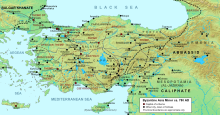| Theme of the Thracesians Θρᾳκήσιον θέμα, θέμα Θρᾳκησίων, Θρᾳκήσιοι | |
|---|---|
| Theme of the Byzantine Empire | |
| 640s–660s / 700s–710s – c. 1078 1097–1330 | |
 The Byzantine themata in c. 780, after the split of the Opsikion. | |
| Capital | Ephesus or Chonae (7th–11th centuries), Philadelphia and later Smyrna (12th–14th centuries) |
| Historical era | Middle Ages |
• Established | 640s–660s or c. 700s–710s |
• Fall to the Seljuks | c. 1078 |
• Byzantine recovery | c. 1097 |
• Fall to the Turks | 1330 |
The Thracesian Theme (Greek: Θρᾳκήσιον θέμα, Thrakēsion thema), more properly known as the Theme of the Thracesians (Greek: θέμα Θρᾳκησίων, thema Thrakēsiōn, often simply Θρᾳκήσιοι, Thrakēsioi), was a Byzantine theme (a military-civilian province) in western Asia Minor (modern Turkey). Created either in the mid-7th or the early 8th century as the settlement of the former Army of Thrace, after which it was named, it was one of the larger and more important themes of the Empire throughout its existence based on its proximity to Constantinople. The Thracesian Theme was one of the longest-lived themes, surviving until the region was conquered by the Turks in the early 14th century.